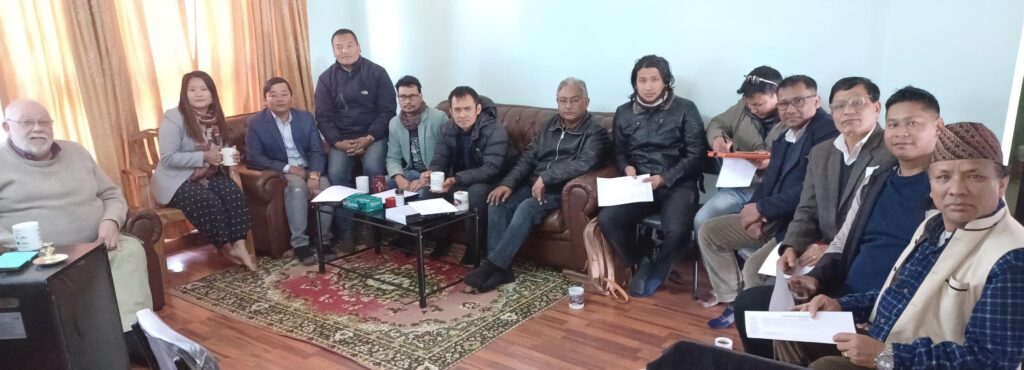Experiencing post-Covid Kathmandu
As the plane approached Tribhuvan International Airport, the snowcapped peaks of the
Himalayas could be seen to the north. The world’s highest mountains were created by the
conflict between two tectonic plates that are constantly pushing against each other. This
mounting pressure is alleviated by small tremors from time to time. Fortunately, the big
earthquakes only happen about every 75 years. So small quakes helps to avoid the big
ones. These days the capital city of Kathmandu is ablaze with activity. There are new five star
hotels going up, creating a different skyline. Some of the old temples and structures that
were destroyed in the earthquake either have been rebuilt or are in the process of rebuilding.
The roads are under construction as the process to widen the Ring Road is very slow.
My first four weeks have been a whirlwind. I have discovered just how much I have been
missed by so many people. While walking down the main street of Thamel, several merchants
came out to greet me. Yes, 3½ years is a long time. The Jesus Seminary is doing well. We
have students from across Nepal. Classes are now done primarily on ZOOM. This has allowed
for students in the far western part of the country to participate in classes. It will open
the doors for those in Africa and other countries to also join with us. According to reports I am getting,
Christianity is now the second largest religion in the country. It has now surpassed Buddhism. Islam continues
to hold a distant fourth place, with little to no growth. Hinduism is the largest religion in the country.
The new government is afraid to publish the results of their survey for fear of upsetting Buddhists and Hindus who have been the majority for centuries. There is a new force rising in the country Indeed, the SON is rising on a new day.
Nepal experienced two lock downs for COVID which hurt everyone economically. People were terrified about the virus, even to the point of some buying and eating cow dung because some people were selling it as a cure along as a preventative. The lock downs were very severe, with people only allowed on the streets for about two hours a day. In the cities, it was strictly enforced by the police who would beat those violating curfew.
According to Pastor Madhav Poudal, 262 pastors died of COVID. Most died from the second wave that hit the country. “Pastors died because they were summoned by families to pray for the sick. As they laid hands on people, they ended up with the disease,” noted Poudal. His church as well as his Bible School was closed down during that time.
Many churches have merged as churches couldn’t afford to pay rent on their property. This may have actually helped to strengthen churches along with giving them stronger financial bases.
COVID still creates fear among the people of Nepal. Many people are still wearing masks, although some of it is due to pollution created by construction in the Kathmandu Valley. Severe lock-downs along with the economic hard-ships has created feelings of hopelessness.
Still the church continues to grow. All the anti-conversion laws have had little to no impact upon the growth of Christianity. People are still being baptized and church membership is growing.
Pastor’s Bible Study
begins in Nepal
Bishop Jan Beaderstadt has started a pastor’s Bible Study in his Kathmandu home. It was the result of comments made at the meeting of pastors for his new leadership class. Bishop Imran Bhatti, an instructor at the Jesus Seminary of the Himalayas, complained that many Nepali pastors have not even read the entire Bible. As Christianity is new in Nepal,
there has not been a strong emphasis on Biblical education. The first class was attended by eleven area pastors.
The class meets weekly on Monday mornings in the city. Pastors are being encouraged to invite others to the fellowship.
They are studying the Pastoral Epistles. Bishop Jan is encouraging them to look at their Christian traditions to see if they match what the Bible says. Some early missionaries instituted rules and regulations that have become followed
more than the Bible. In addition, the study focuses on encouraging pastors to ask questions and talk.
Nepali education does not encourage students to ask questions. This study will do just the opposite.
“It’s been a great start. We got some controversy going which started people asking questions. It’s a great way to bond”, said Bishop Jan.

Christian Leadership Class at the Jesus Seminary of the Himalayas
Bishop Jan L. Beaderstadt (left) is teaching in February a class on Christian Leadership as part of the Jesus Seminary of the Himalayas. Ten students are from the Kathmandu Valley while others will be participating on line from rural parts of Nepal. The Jesus Seminary converted many of the classes to ZOOM because of lock downs. What was discovered was that it opened up opportunities for rural pastors who otherwise could not afford the time to come and stay in Kathmandu. These classes are also giving opportunities for students in other countries to participate. This class is Master Level.
Please pray for our Uganda Crusade April 10—24, 2023
There’s nothing quite as exciting as being part of a crusade for Christ in Africa. Renaissance Outreach Ministries will be featuring Two Crusades right after Easter in the East African Nation of Uganda April 10 through 24. In Uganda, crusades will be held in two locations. One of them is in the capital city of Kampala where the crusade grounds will hold over 5,000 people. A smaller crusade will also be held in the western city of Kigadi where we anticipate anywhere from 1500 to 3000 people in attendance. During the days at each cru-sade location we will have pas-toral training seminars. It is especially important in places like Kigadi which does not have access to local Bible Schools.


Recent Comments